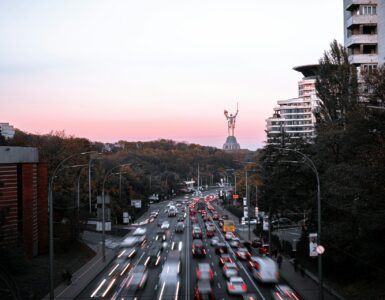UKRAINE
Rebuilding Ukraine: a $1 trillion opportunity? Ukrainian Venture Capital and Private Equity Association (UVCA) in partnership with Aventures Capital organized a closed-door discussion for investors in Davos earlier this month, estimating rebuilding and recovery projects at $1 trillion. [Source: UVCA]
Ukraine’s deputy minister of digital transformation is touting the nation’s most resilient startups like Releaf Paper, YouScan and Workee– which managed to raise tens of millions of dollars during wartime–in his Jan. 29 op-ed in Fast Company. [Source: Fast Company]
THE WAR EFFECT
Russia’s invasion of Ukraine in February 2022 has led to a hike in the number of defense tech startups, previously a no-go field for regional entrepreneurs and investors. The trend is even more evident in the Baltics States and Poland–countries that have historically controversial relations with Russia as well as heightened security concerns. [Source: Sifted]
The Russian war against Ukraine raised concerns about the use of drones that became one of the most useful new kinds of warfare on the battlefield. The main concern is ethical implementation of artificial intelligence that is among key technologies defining how successful drones operate. [Source: Business Insider]
INTERNATIONAL COOPERATION
Russian and Indian scientists are strengthening cooperation across biology, Earth sciences, healthcare, natural sciences, artificial intelligence, cybersecurity and other applications, according to the roadmap signed by both governments. At a workgroup session earlier this month, the St. Petersburg State Technological University proposed to create a Russia-Indian innovation platform to facilitate and implement joint tech projects. [Source: Economic Times]
Russian IT companies are increasingly establishing joint ventures in India with local companies or acquiring them. The trend is driven by the desire to simplify access to the country’s lucrative and growing digital services market and government tenders. [Source: Kommersant]
BUSINESS IN EXILE
Belarus startup hub Imaguru opened new hubs in Spain, Lithuania and Poland in response to crackdowns at home. Belarus’s status as Russia’s ally complicated business for Belarusian companies. [Source: 150 sec]
Russians founded more than 700 companies in Dubai from March to September 2022, and this number set to rise in the future thanks to Dubai’s political neutrality towards Russia and a relatively favorable tax system. Most entrepreneurs are involved in international trade and consulting. [Source: Kommersant]
STARTUPS
US-based investment fund Runa Capital with Russia-born founders and predominantly Russian-speaking management invested in France-based startup quantum computing Welinq. Fund’s partner Dmitry Galperin said that he was “very impressed by their unique technology and the major impact that it can have on quantum computing scale-up”. [Source: EU-startups]
RTP Global, an investment fund of a Russian prominent investor Leonid Boguslavskiy, invested in Podeum, an India-based startup, which is a sports creators-fan engagement platform. The platform that’s growing by double-digits in clientele wants to create an ecosystem for sports creators and fans like the one “Twitch has built for the gaming ecosystem”. [Source: Business World]
The Netherlands-based startup not8 with Russian founders got $109,000 from venture fund Antler that got 12% in the company. not8 is a platform that helps coders redesign and correct their products in a convenient and fast way that saves a great number of work hours. [Source: RB]
CRYPTOCURRENCY
Cryptocurrency BIT added TONcoin (TON) to its options trading making its third cryptocurrency used in options trading along with bitcoin (BTC) and ether (ETH). TON is a cryptocurrency of the TON blockchain, a project that was initially launched by Telegram’s founder Pavel Durov and now implemented by the TON Foundation run by enthusiasts. [Source: BIT]
Russia and Iran are discussing the creation of a gold-backed stablecoin. The new digital currency is supposed to replace the U. S. dollar, Russian rubles and Iranian rial in mutual trade. [Source: Vedomosti]
KAZAKHSTAN
Kazakhstan has a lot of specialists in web design, but sees a big deficit of highly skilled professionals in back-end coding, hardware, Internet of Things (IoT). The local IT industry is still in its early stage of development regarding human resources, which leaves space for specialists from other countries, first of all, Russia-speaking ones. [Source: Devby.io]
Kazakhstan’s parliament approved a draft of a law on licensing cryptocurrency mining business. The document that’s subject to a signing by the President envisages two kinds of licenses: for those who own equipment such as data centers and those who rent it. [Source: Zakon.kz]
Kazakhstan’s share in the global hash rate–a parameter reflecting the computing power consumed for mining of a cryptocurrency–decreased from 18% in early 2022 to just 6,4% in early 2023. The reason is that since 2023 local miners can use energy for operations if only there is an excess of it. [Source: Main]






Add comment